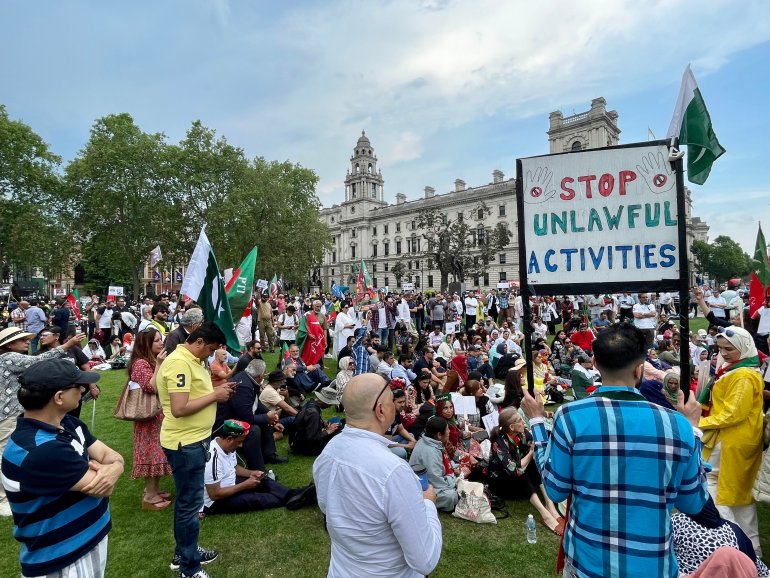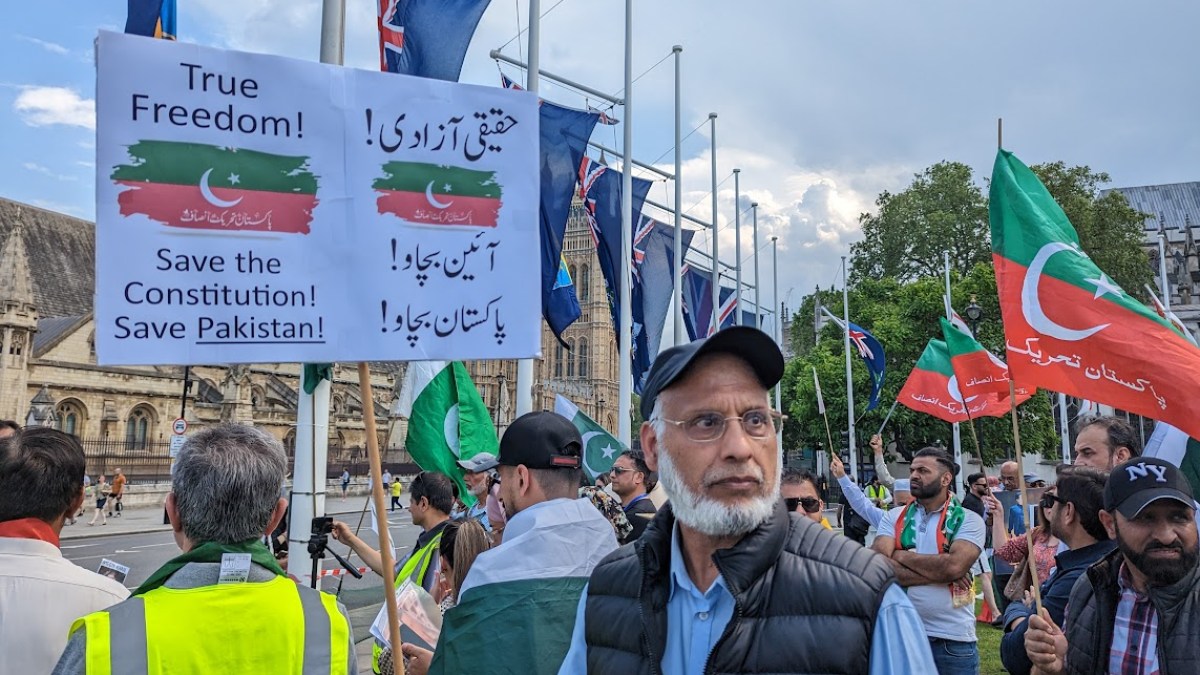‘Foreign-backed drive to remove Khan’: UK Pakistanis protest
London, the United Kingdom – A crowd of about 200 people gathered outside the Houses of Parliament in London on Sunday, waving placards along with green, black and red flags.
The chant “Aaj nahi, to kub? [If not today, then when?]” echoed through loudspeakers across Westminster, while popular Pakistani songs played in the background.
The rally was organised by members of Tehreek-e-Insaf (PTI), a political party set up in 1996 by Pakistan’s former Prime Minister Imran Khan.
Concerned members of the Pakistani diaspora united with the UK-based party members of Khan’s group, calling for free and fair elections and a return to the rule of law.
Madiha*, a digital media specialist in her 30s, had never attended a political protest until Khan’s ousting from power in April last year.
Khan lost a no-confidence vote to his leadership after facing mounting pressure over his foreign policy, the declining economy and a resurgence of the Pakistan Taliban armed group.
Madiha drove for more than three hours from her home in Cardiff, Wales to attend the protest.
“It’s the state of affairs in Pakistan at the moment, myself and others thought it was unjust and believe it’s part of a foreign-backed drive to remove Khan Sahib [Sir Khan] from power,” she told Al Jazeera.

Khan’s supporters were quick to take to the streets of Pakistan after he was ousted, followed by his supporters abroad.
In May this year, Khan was arrested by Pakistan’s anti-corruption agency.
Thousands more took to the streets, with Pakistani police arresting and detaining more than 4,000 people, including journalists, according to Human Rights Watch.
The military-backed government accused the protesters of attacking police and government buildings, as well as military assets and installations.
Khan has denied the accusations and has called for an independent inquiry.
“In his 26 years in politics, Khan Sahib has never called for violence,” said Madiha, “so to blame him for inciting what’s been happening on the streets of Pakistan is unjust.”
In the UK, peaceful protests are protected under the European Convention on Human Rights.
On Sunday, one protester said: “Within Pakistan, there is no longer freedom of expression under the new regime – so it’s up to the overseas Pakistanis to speak out … we’re the only ones who still have a voice.”
Madiha said that the protesters wanted the UK government to take action.
“We must raise our voices for the future of Pakistan, for the women who have been abused in detention by the current regime, for human rights violations and for the return to the rule of law,” she said.
Madiha cited the UK government’s promise to promote and protect democracy and human rights overseas as part of its strategy for international development.
“Western democracies are always speaking about the rule of law, about women’s rights, so why aren’t they helping now?” she asked.
Shehryar Fazli, a London-based political analyst and author, told Al Jazeera that he did not see a significant shift in the UK approach towards the Pakistani military “with whom it enjoys pretty good relations”.
“I think there will certainly be concerns expressed about the conditions for a free and fair election in October, but that said, I don’t think the UK is interested in rocking the boat too much,” Fazli said.
Intolerance for dissent
While Khan supporters within Pakistan have been threatened, beaten and detained, the army is reported to also be attacking family members of those demonstrating outside of Pakistan.
“The way that they target people overseas suggests their tolerance for dissent has declined significantly,” said Fazli.
In London, Sheikh Ahsan stood slightly away from the rest of the protesting crowd. The retired naval officer living in Romford, Essex, told Al Jazeera that his son in Lahore was detained three weeks ago and assaulted by Pakistani police for supporting Khan.
“The country is now owned by the army,” he said, adding that this has not deterred him from taking a stance.
“I’m here to support Khan,” Ahsan said. “We are requesting for the regime to release him and drop the false charges against him.”
Khan was released on May 12, but is facing more than 100 corruption and “terrorism” charges.
He has been calling for early elections to challenge the current government, one that he says has been funded by foreign powers.
Fazli suggested the military would be satisfied to disqualify Khan from the upcoming October elections.
“I don’t think they would necessarily want to go further with a long-term prison sentence. This could agitate his supporters once again,” he noted.
“I think there’s a new tactic now. If we can’t break Imran Khan, break the rest of the party, which they’ve managed to do quite successfully,” Fazli said.
More than 80 senior members of PTI have quit the party in recent weeks.
The mass party exodus, Fazli suggested, was likely coerced through forms of intimidation while party members were in detention.
“There’s a file on everyone, especially politicians. It’s probably the threat – we can put you away for many, many years, or we can affect your businesses, seize your assets, go after your families – or would you like to bow out of politics completely, or join the new party we are helping usher into existence?”
If the PTI goes into the elections weaker this October, with no chance of winning the election, then elections will go ahead, said Fazli.
But Pakistani politics has always played out in back rooms across London, where political dissidents have found refuge and strength since the creation of Pakistan 76 years ago.




